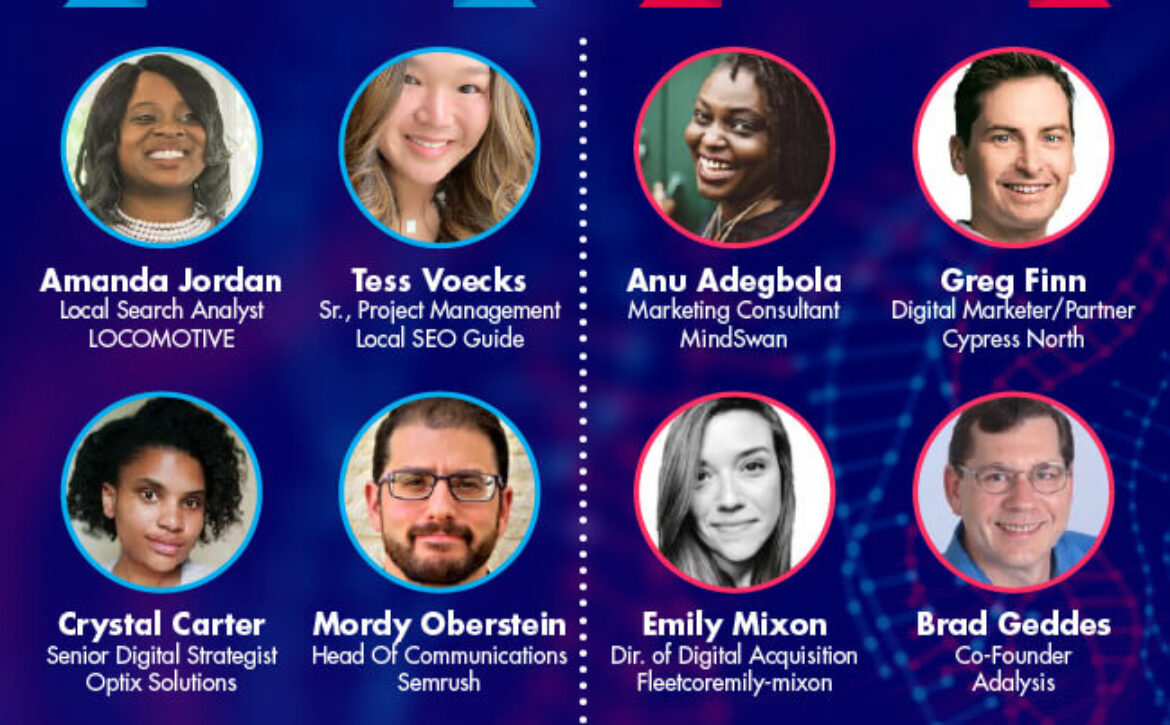Meet the 2021 Search Engine Land Awards judges
Your final chance for industry-wide recognition, awesome social buzz, and a hefty boost to company morale is fast approaching: The 2021 Search Engine Awards entry period closes at the end of this week — Friday, September 3 at 11:59pm PT to be exact!
There’s still time for you to submit your application — especially because the submission process is faster and easier than ever. But before you begin that entry, take a moment to meet the judges, a fabulous panel of seasoned pros across the SEO and PPC spectrum, led by Search Engine Land’s own editorial experts…
… and look over their first-hand advice for what makes a winning SEO or PPC campaign, and thus, a winning Search Engine Land Awards application.
Azeem Ahmad
For me, a successful campaign starts at the end. Yes, you read that right. What I meant by that statement is that for any campaign to be a success, you have to absolutely decide what the measure of success is, and what success looks like for you. Jumping in without clarity often leads to more harm than good for the business.
It’s ok to just say “we want more traffic”, but the great campaigns go a step further and say “with this campaign, we’re looking to increase leads from [x] to [y] – or a [%] YoY growth – by implementing these strategies.”
Crystal Carter
What makes difference in for a good SEO campaign is a clear understanding of the target audience – what you have to offer and what is most genuinely of value to those users. SEO provides a wealth of user data and insights to underpin content, advertising, promotion, and technical improvements. Putting that targeting to good use makes all the difference.
Emily Mixon
My tip for a successful PPC campaign is negative fencing, particularly when you’re in a niche product category, and with all the recent match-type updates and close variants. Crucial to maintaining, and especially improving efficiency, campaigns need to be structured in a way to maintain control of keyword targeting and exclusions in an environment where automation is taking over.
For starters, begin with a phrase match-only campaign with a select few keywords, which you know will have a breadth of search queries matching back to them. For example, if you’re selling kitchen appliances, you could target “ovens” and “ranges”, and then collect the data around all of the search queries matching to them over a period of time. It is key to set a cadence for this, and stick to it, or the amount of search queries to sift through could become unmanageable. My cadence, on a good week, is every Monday, pulling the last 7 days of data.
Next, identify the search queries that are driving significant conversion volume, and add them as exact match keywords into an exact match-only version of the campaign. Do not add them as phrase matches to your phrase match campaign. The point here is to funnel traffic to exact match keywords, for which you can tailor specific and relevant ads and landing page experiences, (ex. [double oven wall unit] or [stainless steel gas ranges]). The phrase match keywords have done their job at this point in identifying converting search queries.
Finally, and most importantly, add the new exact match keywords from your exact match campaign as negative exact match keywords in the phrase match campaign. This helps to ensure that those queries hit the exact match keyword, which should have a better Quality Score and CPC’s than phrase match, and frees up budget for the phrase match keywords to find more search query variations.
Also, while combing through the SQR, be sure to add irrelevant search queries such as, “driving ranges” or “dutch ovens” in this example, as negative keywords to the campaign to help reduce wasted spend.
Anu Adegbola
Regarding what I think makes a successful campaign… a few things straight away come to mind: A good structure based on either site structure, performance of keywords, match types (Broad vs. Phrase vs. Exact). Clear indication of testing being done (ad copy, bid strategies, match types, etc). Robust use of different bid strategies (but according to performance not just a one size fits all solution.
Varied use of ad copy types – expanded text ads, alongside response search ads, dynamics ads, as well as using extra functions like countdowns, IF statements etc. Indication of regular search query analysis being done. Use of automation as needed.
Brett Bodofsky
What makes an effective PPC campaign (specifically Google Ads and Microsoft Ads) is a robust structure which allows for ads that are highly tailored to their targeting. The targeting and copy/creative work together, in unison, to help achieve a clearly defined business objective (obtaining leads, sales, customer retention, creating brand awareness). Landing page also plays an important role in the success of a PPC campaign.
A campaign with refined targeting, bids and creative can drive highly qualified traffic to a page. If the page that traffic is sent to is not what a user would expect, has poor functionality, looks unprofessional, that can severely damage the effectiveness of a PPC campaign.
One factor that gets set up outside of campaigns similar to landing pages that can impact effectiveness is the conversion action. For intelligent bidding decisions and iterations to be made campaigns need a proper conversion action to work off of.
Another factor that can make a PPC campaign effective is time. It sounds so simple, but time allows for data to come in, which helps the machine learning make more informed decisions.
- It is the sum of many aspects which create an effective campaign (settings, targeting, bids, budget, creative, messaging, proper tracking, experimentation, demand, landing page, competition, etc). One of these aspects being off in some way can damage the integrity of your campaign and make it less effective.
- A campaign might not always be effective as soon as you launch or even in the first week or 2, but in due time, with more data in the door, it could become effective through means of machine learning having more to optimize off of and any manual optimizations/iterations the practitioner makes.
Remember: The final deadline is this Friday, September 3 at 11:59pm PT. Standard entrance fees are $595 per application — and you can submit to as many categories as you like.
What are you waiting for? You, your company, and your career deserve this. Begin your application now!
The post Meet the 2021 Search Engine Land Awards judges appeared first on Search Engine Land.




